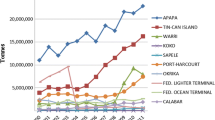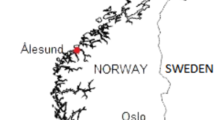Abstract
Port workers services have been usually heavily regulated and reserved exclusively for a special kind of workers, dockworkers, which seems to have been the cause of serious inefficiencies worldwide. During the eighties, law reforms have been introduced to solve this problem. In this paper we analyze and decompose efficiency in cargo handling operations in 19 Spanish ports from 1990 to 1998. The method chosen is that of the parametric estimation of both allocative and technical inefficiency using panel data and a quadratic cost function. Results show that although inefficiency has decreased overall, there has been over utilization of labor regarding capital, and technical inefficiency. This supports the need of further consideration of other aspects including competition.
Similar content being viewed by others
Notes
A general review on port performance can be seen in Cullinane et al. (2006).
Available in “Noticias y novedades”, http://www.aneconom.ull.es/embudria/.
A restricted version of the model was estimated, eliminating fixed effects. Allocative efficiency indices are lower than the unrestricted version by 4.2%.
When the second stage model contains variable constructed from parameters estimated in the first stage, the covariance matrix of the second stage estimator includes noise induced by the first-stage estimates. We have applied the procedure of Murphy and Topel (1985) that give the correct asymptotic covariance matrix of the two stage estimation with least squares when both stages use the same observations.
References
Atkinson S, Cornwell C (1994a) Parametric estimation of technical and allocative inefficiency with panel data. Int Econ Rev 35:231–244. doi:10.2307/2527099
Atkinson S, Cornwell C (1994b) Estimation of output and input technical efficiency using a flexible functional form and panel data. Int Econ Rev 35:245–255
Atkinson SE, Primont D (2002) Stochastic estimation of firm technology, inefficiency and productivity growth using shadow cost and distance function. J Econom 108:203–225. doi:10.1016/S0304-4076(01)00133-6
Coto-Millán P, Baños-Pino J, Rodríguez-Álvarez A (2000) Economic efficiency in Spanish ports: some empirical evidence. Marit Policy Manage 27(2):169–174. doi:10.1080/030888300286581
Cullinane KPB, Song DW (2003) A stochastic frontier model of the productive efficiency of Korean container terminals. Appl Econ 35(3):251–267. doi:10.1080/00036840210139355
Cullinane KPB, Song DW, Ji P, Wang TF (2004) An application of DEA windows to container port production efficiency. Rev Netw Econ 3(2):186–208
Cullinane K, Wang Teng-Fei, Song Dong-Wook, Ping Ji (2006) The technical efficiency of container ports: comparing data envelopment analysis and stochastic frontier analysis. Transp Res A 40:354–374
Díaz-Hernández JJ, Martínez-Budría E, Jara-Díaz S (2008) Productivity in cargo handling in Spanish ports in a period of regulatory reforms. Netw Spat Econ 8:287–295. doi:10.1007/s11067-007-9056-1
Farrell MJ (1957) The measurement of productive efficiency. J R Stat Soc Ser A Gen 120(Part 3):253–281
Jara-Díaz S, Martínez-Budría E, Díaz-Hernández JJ (2006) Multiple output in port cost function. In: Cullinane K, Talley WK (eds) Port economics research in transportation economics, vol 16. Elsevier, pp 67–84
Jara-Díaz S, Tovar B, Trujillo L (2008) On the proper modelling of multioutput port cargo handling costs. Appl Econ 40(13):1699–1705
Kumbhakar SC (1992) Allocative distortions, technical progress and input demand in U.S. airlines: 1970–1984. Int Econ Rev 33(3):723–737. doi:10.2307/2527135
Kumbhakar SC (1997) Modelling allocative inefficiency in a translog cost function and cost share equations: an exact relationship. J Econom 76(1–2):351–356. doi:10.1016/0304-4076(95)01796-8
Kumbhakar SC, Lovell CAK (2000) Stochastic frontier analysis. Cambridge University Press
Kumbhakar SC, Tsionas E (2005) Measuring technical and allocative inefficiency in the translog cost system: a Bayesian approach. J Econom 126(2):355–384. doi:10.1016/j.jeconom.2004.05.006
Maietta OW (2000) The decomposition of cost inefficiency into technical and allocative components with panel data of Italian dairy farms. Eur Rev Agric Econ 27(4):473–495. doi:10.1093/erae/27.4.473
Martínez-Budría E, Díaz-Armas R, Navarro-Ibáñez M, Ravelo-Mesa T (1999) A study of the efficiency of Spanish port authorities using data envelopment analysis. Int J Trans Econ XXVI 2:237–253
Murphy K, Topel R (1985) Estimation and inference in two step econometric models. J Bus Econ Stat 3(4):370–379. doi:10.2307/1391724
Newey WK, West KD (1987) A simple, positive semi-definite, heterokedasticity and autocorrelation consistent covariance matrix. Econometrica 55(3):703–708. doi:10.2307/1913610
Rodríguez-Álvarez A, Tovar B, Trujillo L (2007) Firm time varying and allocative efficiency: an application to port cargo handling firms. Int J Prod Econ 109(1–2):149–161
Schmidt P, Sickles R (1984) Production frontiers and panel data. J Bus Econ Stat 2(4):367–374. doi:10.2307/1391278
Talley WK (2000) Ocean container shipping: impacts of a technological improvements. J Econ Issues XXXIV 4:933–948
Toda Y (1976) Estimation of a cost function when cost is not a minimum: the case of soviet manufacturing industries, 1958–1971. Rev Econ Stat 58:259–268. doi:10.2307/1924947
Tongzon J (2001) Efficiency measurement of selected Australian and other international ports using data envelopment analysis. Transp Res A Policy Pract 35(2):113–128
Tongzon J, Heng W (2005) Port privatization, efficiency and competitiviness: some empirical evidence from container port (terminals). Transp Res A Policy Pract 39(5):405–424. doi:10.1016/j.tra.2005.02.001
Zarocostas J (1996) Port industry jobs worldwide continue to decline. Study Says. J Commer 12:8B
Acknowledgements
This research has been funded by Ministerio de Educación y Ciencia, Plan Nacional de I+D+I, España, Grant SEC2002-01940ECO; by Fondecyt, Chile, Grant 1080140, and the Millennium Institute on Complex Engineering Systems. We are particularly grateful for the suggestions in form and contents made by the Associate Editor on earlier versions of this paper. We also thank Julio Afonso-Rodríguez and Jorge V. Pérez-Rodríguez for their helpful econometric comments. Remaining errors are, of course, ours.
Author information
Authors and Affiliations
Corresponding author
Rights and permissions
About this article
Cite this article
Díaz-Hernández, J.J., Martínez-Budría, E. & Jara-Diaz, S. Parametric estimation of inefficiency in cargo handling in Spanish ports. J Prod Anal 30, 223–232 (2008). https://doi.org/10.1007/s11123-008-0110-x
Published:
Issue Date:
DOI: https://doi.org/10.1007/s11123-008-0110-x
Keywords
- Parametric allocative inefficiency
- Parametric technical inefficiency
- Normalized quadratic cost function
- Cargo handling
- Port economics




